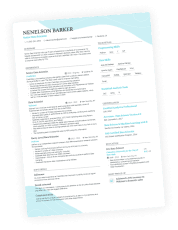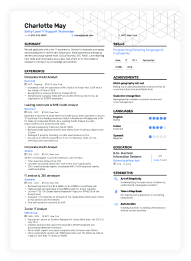When it comes to writing your resume, featuring education is often essential to getting you hired.
But…
It isn’t always clear how you can do that and what the best practices are.
Your level of experience has a massive effect on the way you showcase your education.
For example:
Entry-level candidates must draw attention to their educational background to appeal to recruiters. Seniors with decades of experience would often emphasize other sections.
Between this and that, there are differences you must know before making your resume.
Now, here’s something you should know:
If your education section isn’t making an impact, it’s won’t do you any favors. It must give answers that justify its’ existence on your resume.
That’s precisely why we created this comprehensive guide for you!
The expert advice we share here will help you no matter where you are in your career. We’ll teach you how to create an impactful education that gets you hired.
Ready?
Let’s dive in.
Why featuring education on your resume is a must
If you’ve been frequenting the internet recently, you may have come across these ideas:
- You don’t need any education to succeed in life today
- College is a waste of time, so stay away from it
- The job market is no longer interested in your education
While some of that is enticing to hear, the reality of the situation tells us the opposite.
Unless you’re in a super creative field, the job market is still decades away from ditching formal schooling and college.
Education remains one of the top hiring factors in the majority of industries today.
The world is making a slow transition towards self-learning. Yet, most businesses are unwilling to take a risk and hire candidates with no educational background.
That’s even more true in traditional job positions such as finance and accounting, where formal education is more than necessary.
Now, here are five reasons why education will always be essential for your resume:
1- It serves as proof of competence
Many companies today are asking for an academic degree in their job offers.
That’ simply because…
Before hiring anyone, recruiters have to skim through a massive list of candidates. They need specific measures to choose from that list and make a well-informed hiring decision.
Being a brilliant student with a high GPA is a great way to stand out from the pack. It will help set you apart and quickly draw attention to your competence.
That’s even more true in entry-level positions where education is the main criteria for getting you hired.
2- It explains the gaps in your past
Believe it or not…
Many applicants lose job opportunities due to unexplained gaps in their resume — even if it was because of them going back to school!
You may wonder: But why wouldn’t the recruiter just ask me about the gap?
In a perfect world, they would.
But in their experience, the main explanation for an unemployment gap is unemployment. Headhunters will assume you’ve been unemployed and skip your resume — while the truth you were doing your best to advance in your career.
The point from all this is straightforward:
If you have any employment gaps due to school, including education is even more vital.
3- It increases job relevance
Showcasing your degree on your resume helps increase your relevance to the job position.
Although they won’t say it:
Recruiters will regard your educational background as an additional job experience.
They know you weren’t working in college. However, taking relevant classes allows you to learn the fundamentals of your work.
That’s another reason why businesses today prefer to hire candidates with a degree.
4- It highlights your hard work and longterm investment in your career
This point is super crucial, yet it’s often overlooked by lots of job seekers.
Recruiters prefer a hardworking candidate ready to be in for the long haul. They want someone who’ll go the extra mile to learn the ins and outs of the industry and help the business thrive.
What’s a better way to demonstrate that than showing how you’ve invested years of your life to attain a degree in your field?
Your educational degree proves your early commitment. It shows that you’re invested in your career and helps recruiters see why you’re the best.
5- It doesn’t hurt your chances anyways
Education is a crucial section that many headhunters expect to see in your resume, even if not asked for. Besides, it won’t take much space on the page and can be read within seconds.
So, you’ve got nothing to lose!
But here’s something to think about:
Imagine you were a recruiter with two candidates left on your desk. They have the same job experience, soft/technical skills, and are both ready to work with you.
Except…
One of them has a Bachelor’s degree, while the other one doesn’t.
It doesn’t take much thinking before you pick the applicant with an education.
You have everything to win.
What should my education section look like?
The objective and impact of your education section will differ based on your circumstances. The detail required within your education section as a high-school student will be very different from when you’re a working professional with 10+ years of experience.
We’ve broken things down into four simple questions: what, where, how, and why.
- What should an education section cover in a resume?
- Where should this section go?
- How do you describe your educational background?
- Why will education work to your advantage?
Education Section As a High-School Student
What?
The name of your school, the year you started at your school, and a brief description of classes and/or extra-curricular activities you’re involved in.
It’s no harm to include your GPA, too.
Where?
This depends on how much working experience you have. In general, your education section should be at the top of your resume, just under your resume header.
How?
When describing classes you’ve taken, tailor them to the position you’re applying for.
For example:
If you’re applying for a role in retail and have taken classes in Business and Math, these would be particularly relevant. Languages classes would be relevant here, too. You can mention your individual grades in these classes.
When it comes to extracurricular activities you’re involved in, describe what you did, rather than what it was. For example, planted 300 trees as part of the environmental club. Simply listing that you’re a member of many clubs doesn’t mean very much.
Why?
Placing your education section near the top (beginning) of your resume is important as its one of the only formal records of work you have done.
This allows hiring managers to see your ability to perform real-world tasks and to pick up new skills.
Here’s an example Education Section for a high school student resume:

Education Section as a College Student/Recent Graduate
What?
Your university, the title of your degree, your GPA, any relevant courses you have taken or are taking, and the period of your studies.
Where?
If you have a couple years of work experience in your field, you can place your education after that. Otherwise, you must feature your education prominently near the top of your resume.
Why?
Simply because your recent graduation should explain your lack of experience. That will stop recruiters from wondering why you lack expertise or where you’ve been in the past years.
Consider separating extra-curricular activities into a volunteering section as college extracurriculars tend to include more of a dedication and skill-set than high-school equivalents.
How?
Much like in a first job resume, tailor any classes you’ve taken to the position you’re applying to.
Giving insight into any software packages or skills you’ve developed over the course of your degree as a current student is also helpful here.
As a recent graduate, you should include your final grade and any information on your thesis or dissertation.
Why?
Your education is your base. Showing the recruiter where you have developed your academic skills allows them to judge your theoretical framework and get a peek into the areas you know best.
Recruiters won’t expect you to know the ins-and-outs of practical experience in a certain field. They simply want to know you’re starting with an understanding and not from scratch.
Here’s a resume template for a college student/recent graduate education section:


Education Section as An Experienced Professional
What?
The university you studied at and its’ location, the title of your degree, and your GPA (if it is high enough to meet the job criteria).
Where?
As an experienced professional, your education takes less prominence.
Hiring managers are more interested in your work history and skills than your education. Yet, they still want to know about your educational qualifications to make sure you’re fit for the job.
Thus, you must place this section at the end of your resume or after your previous experience.
How?
In general, you won’t need to include the classes you’ve taken in your education section — unless you’ve recently obtained your degree in a newer area.
Why?
Suppose you’ve built your base and have been working in your field for a number of years. The recruiter doesn’t need to check your education to see if you have an ability in the area.
Your work history does all that for you.
Your education section completes the story of your career and gives insight into who you are more than it does prove your potential impact.
The section below is a great resume example of a job-winning education section:


General Tips for Your Education Section
- If listing a number of degrees, do so in reverse-chronological order
- Always be specific – if you’re applying to a job in marketing and have a degree in sales and marketing, your marketing degree should be given preference
- Don’t lie about your grades or completion of a degree as that can be easily checked
- If you’re graduated from a top-tier university, be sure to highlight its’ name first to draw attention to it and leave a strong impression
- You can include your education even if you haven’t completed the degree, either state the number of credits you’ve completed or simply when you expect to graduate
Perfecting the education section on your resume
Recruiters look to your education to reference your ability to pick up new skills, meet deadlines, and apply yourself to new challenges.
The importance of your education changes as you progress throughout your career. Fortunately, this doesn’t mean you have to take your education off to cut down on resume length.
Applying general tips such as being specific in the information you give helps increase the impact your education section has too.
To create a resume education section as clear and impactful as the examples you’ve seen above, you can utilize Enhancv’s resume builder. Check out some examples here for inspiration.
Tip: Struggling with how to convey your informal education to employers? Check out our post!
Make one that's truly you.




